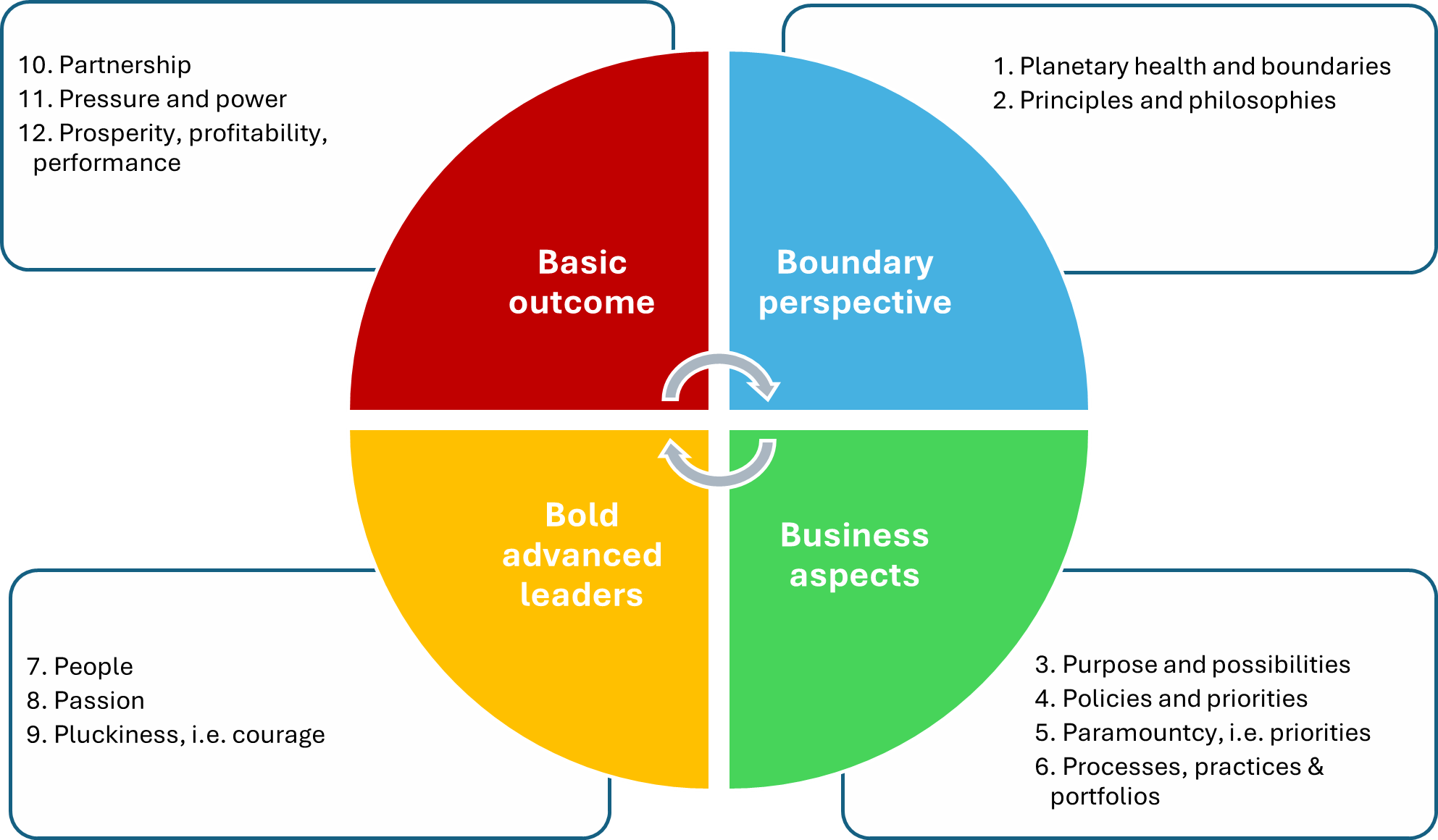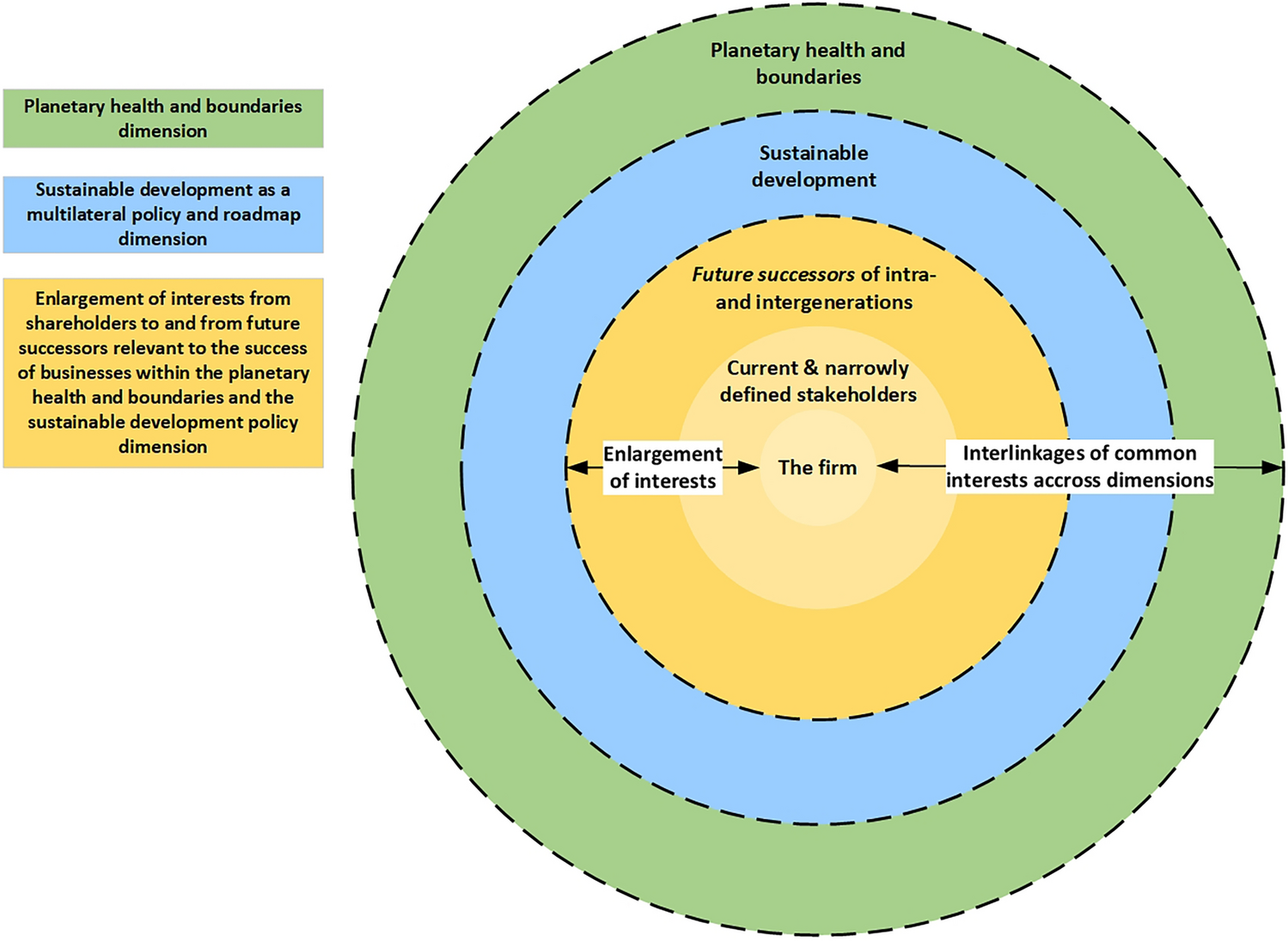Paradigm shift from shareholders and stakeholders to future successors
Published in Sustainability and Business & Management
Theories including the ones falling under the shareholder and the stakeholder paradigms, and corporate social responsibility (CSR) and corporate sustainability (CS) are used to explain business relationships with the internal and external environment in which they operate. However, their environment is becoming more and more complicated given the environmental and social issues they are expected to address by stakeholders, as many of these issues are caused by businesses that have externalized the true cost of doing business, such as through emissions of greenhouse gases, pollution caused by business operations, poverty and unsafe working conditions of workers within their value chains and so one. The paper (Johannsdottir & Davidsdottir, 2024) therefore explores the limitations of these theories in addressing the complex responsibilities of businesses today and proposes a paradigm shift from these theories towards a focus on future successors defined in the paper “as those that will take over the running of businesses from the current managers, whether they are children, grandchildren, great-grandchildren of all genders, or others who belong to future generations not currently running businesses” (p.2).
The paper argues that none of the theories discussed above sufficiently account for the negative long-term impacts of business activities on society and the environment. Therefore, the authors propose a new theoretical framework and a roadmap to emphasize and incorporate the future successor’s interests into the daily operations of businesses. The future successors as the definition indicates are the generations, both the ones living today and those not yet born, that will inherit the outcomes of businesses’ strategic directions and decisions made by current business leaders. This approach integrates the environmental constraints made by the boundaries of the planet and the sustainable development that must happen. The paper explains that by focusing on short-term financial interest and financial wealth maximization for shareholders alone will make future successors vulnerable, while long-term sustainability interests and value maximization focusing on future successors will help them thrive, see Fig. 1.

Fig. 1 Typology of firms’ maximization interests and future successors’ outcomes
The paper includes a theoretical model explaining how businesses should operate in such a way that they account for planetary health and boundaries where sustainable development serves as a multilateral policy and a roadmap guiding business operations. Within those boundaries and a roadmap, there must be an enlargement of interests from current and narrowly defined interests of stakeholders to future successors of intra- and intergenerations. The model combines boundaries, stakeholders and actors (businesses) and their interests, as well as including the dimension of future successors. The paper furthermore provides examples of how some forward-thinking governments and businesses are currently moving in this direction by incorporating the interests of future generations and the natural environment into their policies and actions.
The paper also provides a strategic roadmap of 12Ps for future successors to thrive and prosper within planetary boundaries (Johannsdottir & Davidsdottir, 2024). The 12Ps are shown in Fig. 2, where one first looks at the boundary perspective, then the business aspects, followed by the traits of bold and advanced leaders, before considering the basic outcome.

Fig. 2. A strategic roadmap of 12Ps for future successors to thrive and prosper within planetary boundaries
Conclusion
By proposing a paradigm shift from shareholders and stakeholders to future successors the paper explores a new way of thinking about the responsibilities of business, and the role and responsibilities of business leaders, in today’s business environment. This is done by arguing that the shareholder, stakeholder, CSR and CS theoretical approaches do not sufficiently address today’s complicated business environment and global challenges that must be solved, instead offering alternative solutions by presenting new theoretical models and a roadmap demonstrating how to move forward so business operation do not harm the interests of future generations, in this case framed as future successors. In essences, the key message of the paper is about changing the focus and the scope of corporate responsibility/corporate sustainability so that the interests of future successors are incorporated, thus ensuring that businesses contribute in a positive way to sustainable development and a prosperous future for all.
References
Johannsdottir, L., & Davidsdottir, B. (2024). Proposed paradigm shift from shareholders and stakeholders to future successors. Discover Sustainability, 5(1), 194. https://doi.org/10.1007/s43621-024-00402-3
Follow the Topic
-
Discover Sustainability

A multi-disciplinary, open access, community-focussed journal publishing results from across all fields relevant to sustainability research whilst supporting policy developments that address all 17 of the United Nations Sustainable Development Goals (SDGs).
What are SDG Topics?
An introduction to Sustainable Development Goals (SDGs) Topics and their role in highlighting sustainable development research.
Continue reading announcementRelated Collections
With Collections, you can get published faster and increase your visibility.
Artificial Intelligence and Digital Innovation in Advancing Sustainable Development Goals
This Collection is expected to explore the role of Artificial Intelligence (AI) and digital innovation in improving progress toward the United Nations Sustainable Development Goals (SDGs). We aim to highlight interdisciplinary research, technological breakthroughs, and practical applications that leverage AI-driven tools, data science, and digital systems to tackle global challenges such as poverty, climate change, healthcare, education, and sustainable infrastructure. This Collection provides a platform for advancing responsible and inclusive innovation by closely bridging technology and sustainability.
This Collection supports and amplifies research related to SDG 9, SDG 11, SDG 12, SDG 13 & SDG 16
Keywords: Artificial Intelligence, Digital Innovation, Sustainable Development Goals, Smart Technologies, Data Science, Climate Action, Ethical AI, Smart Cities, Digital Transformation.
Publishing Model: Open Access
Deadline: Mar 01, 2026
Advancing Sustainable Development: The Role of Circular Economy Practices, Green Innovation and Corporate Responsibility
Achieving sustainable development, as envisioned in the United Nations’ 2030 Agenda, requires transformative solutions to reconcile economic growth with environmental and social imperatives. Circular economy practices, green innovations, and corporate responsibility stand out as critical drivers in this effort—reducing resource depletion, fostering innovation, and embedding accountability into global systems. Yet, their combined potential to accelerate progress toward the Sustainable Development Goals (SDGs) remains underexplored. This Collection aims to unravel these synergies, offering actionable insights for researchers, policymakers, and practitioners committed to a sustainable future.
Keywords: Sustainable Development, Circular Economy Practices, Green Innovation, Corporate Responsibility, Challenges and Opportunities in Sustainable Development.
This Collection supports and amplifies research related to SDG 7, SDG 12, SDG 13 and SDG 17.
Publishing Model: Open Access
Deadline: Apr 01, 2026



Please sign in or register for FREE
If you are a registered user on Research Communities by Springer Nature, please sign in